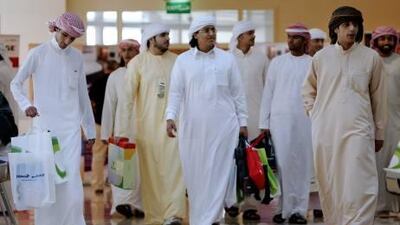DUBAI // Young Emiratis were told yesterday they must sharpen their work skills to survive in an increasingly competitive job market.
Improving the work skills of Emiratis was crucial to the nation's overall economic sustainability, said Dr Zain Alsharif, the director of standards and policies at the Ministry of Labour in Dubai.
"The point is that the UAE needs a different workforce than the one that it had in the 1970s," Dr Alsharif told a session at the Counselling Arabia conference yesterday at Sharjah Higher Colleges of Technology. "The government strategy for 2021 is to transform the economy from an oil-based economy to a knowledge-based economy.
"We need to support the competitiveness of UAE nationals in the labour market, so they are better able to compete with non-nationals."
Dr Alsharif said the UAE's youth needed to be psychologically prepared to rise to the challenge.
"We need to advise our youth about what the labour market requires so that they can eventually find a job," he said.
"A mindset change needs to take place for competitiveness to occur. Nationals want the private sector, but they are looking for the right environment."
The five components listed as critical to a knowledge-based economy were: appropriate qualifications; work experience; soft skills such as personal motivation; realistic expectations of the workplace; and awareness of the benefits of hiring and developing the skills of Emiratis.
"We tell the private sector to train and utilise UAE nationals, but we also need to tell young people that they need to spend two to three years getting trained, before they can move to a better job," Dr Alsharif added.
According to Ministry of Economy statistics for 2009, the Emirati unemployment rate stands at 7 per cent, while 87 per cent of nationals work in the public sector and just 7 per cent work in the private sector.
Dr Georgia Daleure, the chairperson of the Applied Business Technology programme at Sharjah HCT, pointed to significant trends such as a growing generation gap between young and old members of Emirati families.
"As the generation gap gets wider and has more tiers, the young people begin to feel more isolated because the society, culture and traditional beliefs that supported their parents and grandparents are no longer there," she said.
"They are increasingly influenced by global factors."
The gender gap in post-secondary education was identified as a key factor. About two thirds of university students are women, and just one third are men.
Dr Daleure agreed with Dr Alsharif about the need to align expectations with the realities of the workplace.
"When people want to go into the workforce, there has to be the perception that they have to start at the bottom, and the understanding that they need to get the experience so that they can in time get what they want," she said.
"We have to have career paths, so youth know that in a few years they will achieve their goals."

